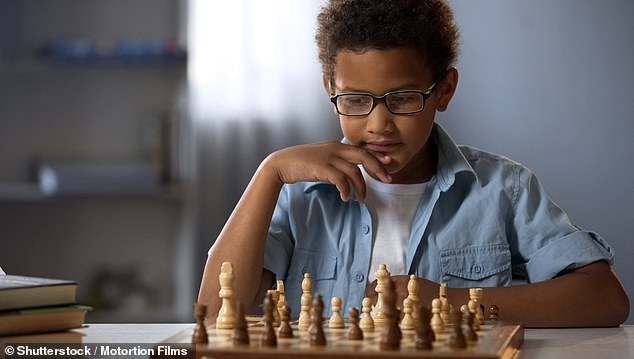The Queen’s Gambit had it spot on! Female chess players are seen as having less potential than males, study finds
- For the study, 286 parents and mentors of 654 chess children were interviewed
- Female players recently signed an open letter on ‘sexist and sexual violence’
<!–
<!–
<!– <!–
<!–
<!–
<!–
Netflix’s hit show The Queen’s Gambit focuses on a female chess player competing to become the world’s greatest player in a male-dominated sport.
That may be set in the 1950s and 1960s, but new research suggests that today’s young women face a similar gender bias – as they are believed to have less potential than their male counterparts.
Worse yet, that belief comes from their parents and mentors, according to the study published by the American Psychological Association.
“It is disheartening to see how the potential of young female players is degraded, even by the people closest to them, such as their parents and coaches,” said lead researcher Sophie Arnold of New York University.
In 2020, only 14 percent of all U.S. Chess Federation players were girls or women, with the sport also embroiled in sexual abuse claims.

Research: A new study shows that female chess players have less potential than men. Even worse, that belief comes from their parents and mentors (stock image)


Netflix’s hit show The Queen’s Gambit focuses on a female chess player competing to become the world’s greatest player in a male-dominated sport
More than 100 high-ranking female chess players and coaches recently signed an open letter about ‘sexist and sexual violence’ in the male-dominated chess world.
They said this was “one of the main reasons why women and young girls, especially in their teenage years, stop playing chess.”
The new study claims that young female chess players also face gender bias when it comes to competition.
In response to an online survey, 286 parents and mentors of 654 children on the US Chess Federation mailing list said they thought girls had less potential than boys.
This was especially true if they believed that genius was required to succeed at chess, the researchers said.
Ninety percent of adults surveyed were men and 81 percent of children were boys – highlighting the extent of gender inequality in sport.
“Gender bias can also prevent girls from taking up competitive chess if their own parents and mentors are not convinced they will succeed,” Arnold said.
The research also found that parents felt girls had a less supportive environment than boys, although mentors/coaches disagreed with this view.
Regardless of this view, neither thought that girls were more likely to quit chess due to a lack of support.
Researchers cautioned that the results do not reflect the views of the general public because those who participated in the study were involved in the chess world.


In response to an online survey, 286 parents and mentors of 654 children on the US Chess Federation mailing list said they thought girls had less potential than boys (stock image)
The study also did not include enough mothers and female mentors to determine whether their views differed from those of fathers and male mentors, she added.
Nevertheless, Arnold said the research showed that more work needs to be done to tackle gender bias within chess.
“Continued structural support for all female players is needed to improve the chess experiences of girls and women,” she said.
‘Our research also suggests that prejudice can come even from those closest to girls.’
The research has been published online in the Journal of Experimental Psychology: General.
